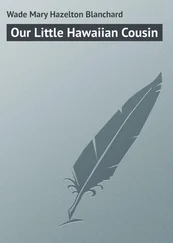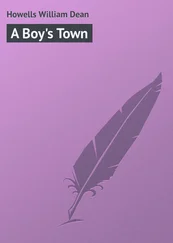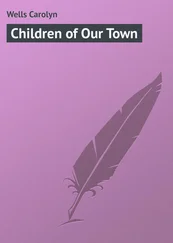William White - In Our Town
Здесь есть возможность читать онлайн «William White - In Our Town» — ознакомительный отрывок электронной книги совершенно бесплатно, а после прочтения отрывка купить полную версию. В некоторых случаях можно слушать аудио, скачать через торрент в формате fb2 и присутствует краткое содержание. Жанр: foreign_prose, foreign_antique, на английском языке. Описание произведения, (предисловие) а так же отзывы посетителей доступны на портале библиотеки ЛибКат.
- Название:In Our Town
- Автор:
- Жанр:
- Год:неизвестен
- ISBN:нет данных
- Рейтинг книги:5 / 5. Голосов: 1
-
Избранное:Добавить в избранное
- Отзывы:
-
Ваша оценка:
- 100
- 1
- 2
- 3
- 4
- 5
In Our Town: краткое содержание, описание и аннотация
Предлагаем к чтению аннотацию, описание, краткое содержание или предисловие (зависит от того, что написал сам автор книги «In Our Town»). Если вы не нашли необходимую информацию о книге — напишите в комментариях, мы постараемся отыскать её.
In Our Town — читать онлайн ознакомительный отрывок
Ниже представлен текст книги, разбитый по страницам. Система сохранения места последней прочитанной страницы, позволяет с удобством читать онлайн бесплатно книгу «In Our Town», без необходимости каждый раз заново искать на чём Вы остановились. Поставьте закладку, и сможете в любой момент перейти на страницу, на которой закончили чтение.
Интервал:
Закладка:
One night, after a long wrangle which ended in a discourse by the "father," a strange thing happened. Larmy and It were contending as to whether It was merely a hypnotic influence on the boy, of someone living whom they did not know, or what It claimed to be, a disembodied spirit. By way of diversion, the reporter had just run a binder's needle under one of the boy's finger-nails to see whether he would flinch. Then the Voice that was coming from David's mouth spoke and said: "I will show you something to prove it;" and the entranced boy rose and went to the back room, while the two others followed him.
He turned the lever that flashed the light on his linotype, and set the little motor going. He lifted up the lid of the metal-pot, to see if the fire was keeping it molten. Then the boy sat at the machine with his hands folded in his lap, gazing at the empty copy-holder out of dead eyes. In a minute—perhaps it was a little longer—a brass matrix slipped from the magazine and clicked down into the assembler; in a second or two another fell, and then, very slowly, like the ticks of a great clock, the brasses slipped—slipped—slipped into their places, and the steel spaces dropped into theirs. A line was formed, while the boy's hands lay in his lap. When it was a full line he grabbed the lever, that sent the line over to the metal-pot to be cast, and his hand fell back in his lap, while the dripping of the brasses continued and the blue and white keys on the board sank and rose, although no finger touched them.
Larmy squinted at the thing, and held his long, fuzzy, unshaven chin in his hand. When the second line was cast the reporter broke the silence with: "Well, I'll be damned!" And the Voice from David's mouth replied: "Very likely." And the clicking of the brasses grew quicker.
Seven lines were cast and then the boy got up and went back to the couch in the front room, where he yawned himself, apparently, through three strata of consciousness, into his normal self. They took a proof of what had been cast, but it was in Latin and they could not translate it. David himself forgot about it the next day, but the reporter, being impressed and curious, took the proof to the teacher of Latin at the college, who translated it thus: " He shall go away on a long journey across the ocean, and he shall not return, yet the whole town shall see him again and know him—and he shall bring back the song that is in his heart, and you shall hear it. "
The next week the "Maine" was blown up, and in the excitement the troubles of David were forgotten in the office. Moreover, as he had to work overtime he put his soul deeper into the machine, and his nerves took on something of the steel in which he lived. The Associated Press report was long in those days, and the paper was filled with local news of wars and rumours of wars, so that when the call for troops came in the early spring, the town was eager for it, and David could not wait for the local company to form, but went to Lawrence and enlisted with the Twentieth Kansas. He was our first war-hero for thirty years, and the town was proud of him. Most of the town knew why he went, and there was reproach for the blonde in the Racket Store, who had told the girls it would be in June and that they were going East for a wedding trip.
When David came back from Lawrence an enlisted man, with a week in which to prepare for the fray, the Imperial Club gave him a farewell dance of great pride, in that one end of Imperial Hall was decorated for the occasion with all the Turkish rugs, and palms, and ferns, and piano-lamps with red shades, and American flags draped from the electric fixtures, and all the cut-glass and hand-painted punch-bowls that the girls of the T. T. T. Club could beg or borrow; and red lemonade and raspberry sherbet flowed like water. Whereat David Lewis was so pleased that he grew tearful when he came into the hall and saw the splendour that had been made for him. But his soul, despite his gratitude to the boys and girls who gave the party, was filled with an unutterable sadness; and he sat out many dances under the red lamp-shades with the various girls who had been playing sister to him; and the boys to whom the girls were more than sisters were not jealous.
As for the blonde, she beamed and preened and smiled on David, but her name was not on his card, and as the silk-salesman was on the road, she had many vacant lines on her programme, and she often sat alone by a card-table shuffling the deck that lay there. The boy's eyes were dead when they looked at her and her smile did not coax him to her. Once when the others were dancing an extra David sat across the room from her, and she went to him and sat by him, and said under the music:
"I thought we were always going to be friends—David?" And after he had parried her for a while, he rose to go away, and she said: "Won't you dance just once with me, Dave, just for old sake's sake before you go?" And he put down his name for the next extra and thought of how long it had been since the last June dance. Old sake's sake with youth may mean something that happened only day before yesterday.
The boy did not speak to his partner during the next dance but went about debating something in his mind; and when the number was ended he tripped over to the leader of the orchestra, whom he had hired for dances a score of times, and asked for "Love's Golden Dream Is Past" as the next "extra." It was his waltz and he didn't care if the whole town knew it—they would dance it together. And so when the orchestra began he started away, a very heart-broken, brown-eyed, olive-skinned little Welshman, who barely touched the finger-tips of a radiant, overdeveloped blonde with roses in her cheeks and moonlight in her hair. She would have come closer to him but he danced away and only hunted for her soul with his brown Celtic eyes. And because David had asked for it and they loved the boy, the old men in the orchestra played the waltz over and over again, and at the end the dancers clapped their hands for an encore, and when the chorus began they sang it dancing, and the boy found the voice which cheered the "Men of Harlech," the sweet, cadent voice of his race, and let out his heart in the words.
When he led her to a seat, the blonde had tears on her eyelashes as she choked a "good-by, Dave" to him, but he turned away without answering her and went to find his next partner. It was growing late and the crowd soon went down the long, dark stairway leading from Imperial Hall, into the moonlight and down the street, singing and humming and whistling "Love's Golden Dream," and the next day they and the town and the band came down to the noon train to see the conquering hero go.
It was lonesome in the office after David went, and his music-box in the corner was dumb, for we couldn't find the brass lever for it, though the printers and the reporters hunted in his trunk and in every place they could think of. But the lonesomest things in the world for him were the machines. The big press grew sulky and kept breaking the web, and his linotype took to absorbing castor-oil as if it were a kind of hasheesh. The new operator could run the new machine, but David's seemed to resent familiarity. It was six months before we got things going straight after he left us.
He wrote us soldier letters from the Presidio, and from mid-ocean, and from the picket-line in front of Manila. One afternoon the messenger-boy came in snuffling with a sheet of the Press-report. David's name was among the killed. Then we turned the column rules on the first page and got out the paper early to give the town the news. Henry Larmy brought in an obituary, the next day, which needed much editing, and we printed it under the head "A Tribute from a Friend," and signed Larmy's name to it.
The boy had no kith or kin—which is most unusual for a Welshman—and so, except in our office, he seemed to be forgotten. A month went by, the season changed, and changed again, and a year was gone, when the Government sent word to Larmy—whom the boy seemed to have named for his next friend—that David's body would be brought back for burial if his friends desired it. So in the fall of 1900, when the Presidential campaign was at its height, the conquering hero came home, and we gave him a military funeral. The body came to us on Labor Day, and in our office we consecrated the day to David. The band and the militia company took him from the big stone church where sometimes he had gone to Sunday-school as a child, and a long procession of townsfolk wound around the hill to the cemetery, where David received a salute of guns, and the bugler played taps, and our eyes grew wet and our hearts were touched. Then we covered him with flowers, whipped up the horses and came back to the world.
Читать дальшеИнтервал:
Закладка:
Похожие книги на «In Our Town»
Представляем Вашему вниманию похожие книги на «In Our Town» списком для выбора. Мы отобрали схожую по названию и смыслу литературу в надежде предоставить читателям больше вариантов отыскать новые, интересные, ещё непрочитанные произведения.
Обсуждение, отзывы о книге «In Our Town» и просто собственные мнения читателей. Оставьте ваши комментарии, напишите, что Вы думаете о произведении, его смысле или главных героях. Укажите что конкретно понравилось, а что нет, и почему Вы так считаете.












